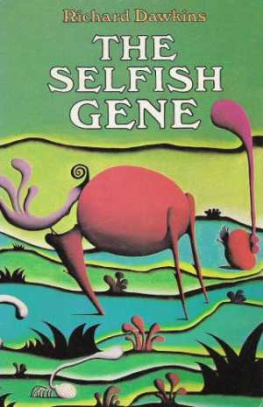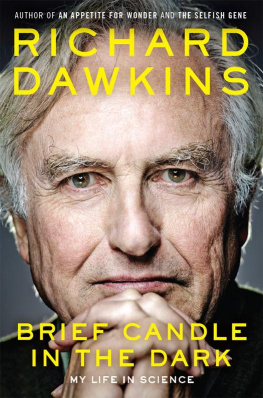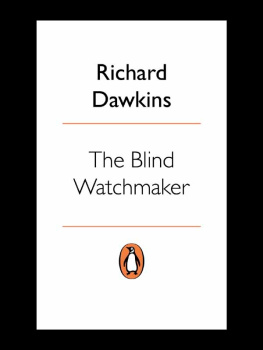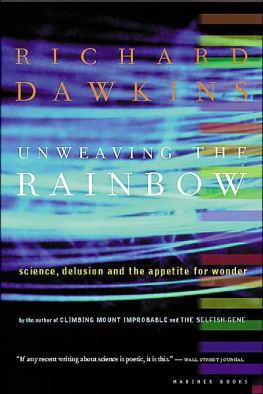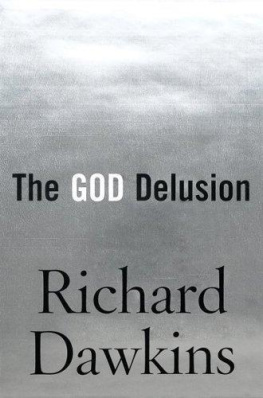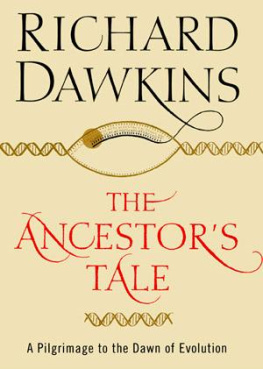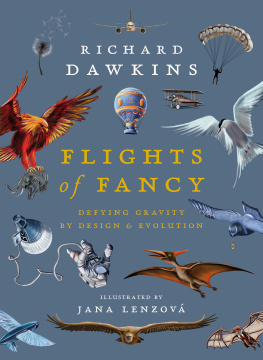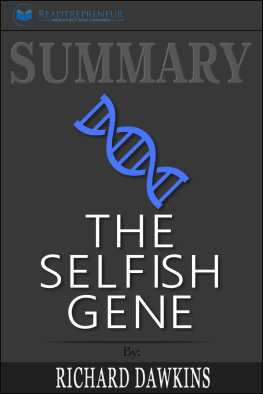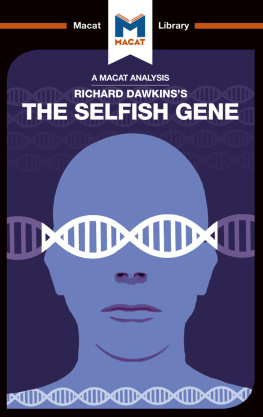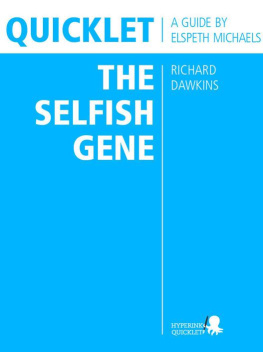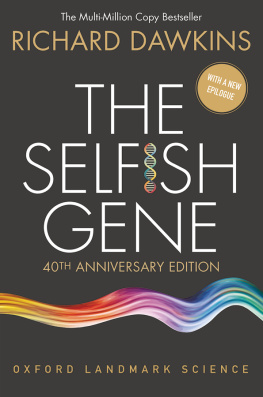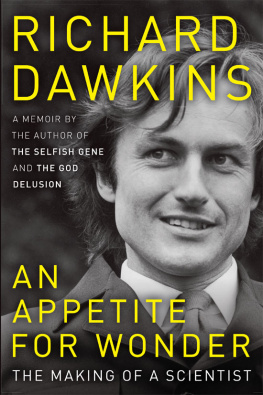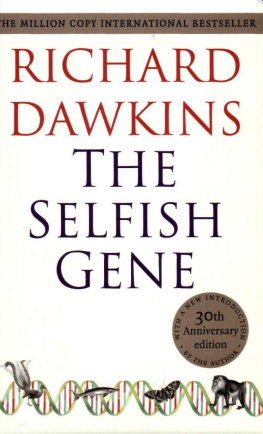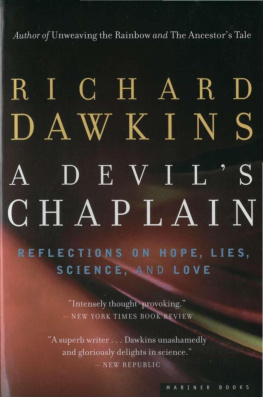The Selfish Gene
by
Clinton Richard Dawkins
1976
 All Your Books Are Belong To Us !
All Your Books Are Belong To Us ! http://c3jemx2ube5v5zpg.onion
The Selfish Gene
Copyright 1976 Clinton Richard Dawkins
First published in 1976
this version published 1989
"Who should read this book? Everyone interested in the universe and their place in it." - Jeffrey R. Baylis, Animal Behaviour
Our genes made us. We animals exist for their preservation and are nothing more than their throwaway survival machines. The world of the selfish gene is one of savage competition, ruthless exploitation, and deceit. But what of the acts of apparent altruism found in nature-the bees who commit suicide when they sting to protect the hive, or the birds who risk their lives to warn the flock of an approaching hawk? Do they contravene the fundamental law of gene selfishness? By no means: Dawkins shows that the selfish gene is also the subtle gene. And he holds out the hope that our species-alone on earth-has the power to rebel against the designs of the selfish gene. This book is a call to arms. It is both manual and manifesto, and it grips like a thriller.
The Selfish Gene, Richard Dawkins's brilliant first book and still his most famous, is an international bestseller in thirteen languages. For this new edition there are two major new chapters.
"learned, witty, and very well written...exhilaratingly good ." - Sir Peter Medawar, Spectator
Richard Dawkins is a Lecturer in Zoology at Oxford University and a Fellow of Mew College, and the author of The Blind Watchmaker.
Contents
Preface to 1976 edition
This book should be read almost as though it were science fiction. It is designed to appeal to the imagination. But it is not science fiction: it is science. Cliche or not, 'stranger than fiction' expresses exactly how I feel about the truth. We are survival machines-robot vehicles blindly programmed to preserve the selfish molecules known as genes. This is a truth which still fills me with astonishment. Though I have known it for years, I never seem to get fully used to it. One of my hopes is that I may have some success in astonishing others.
Three imaginary readers looked over my shoulder while I was writing, and I now dedicate the book to them. First the general reader, the layman. For him I have avoided technical jargon almost totally, and where I have had to use specialized words I have defined them. I now wonder why we don't censor most of our jargon from learned journals too. I have assumed that the layman has no special knowledge, but I have not assumed that he is stupid. Anyone can popularize science if he oversimplifies. I have worked hard to try to popularize some subtle and complicated ideas in non-mathematical language, without losing their essence. I do not know how far I have succeeded in this, nor how far I have succeeded in another of my ambitions: to try to make the book as entertaining and gripping as its subject matter deserves. I have long felt that biology ought to seem as exciting as a mystery story, for a mystery story is exactly what biology is. I do not dare to hope that I have conveyed more than a tiny fraction of the excitement which the subject has to offer.
My second imaginary reader was the expert. He has been a harsh critic, sharply drawing in his breath at some of my analogies and figures of speech. His favourite phrases are with the exception of; 'but on the other hand'; and 'ugh'. I listened to him attentively, and even completely rewrote one chapter entirely for his benefit, but in the end I have had to tell the story my way. The expert will still not be totally happy with the way I put things. Yet my greatest hope is that even he will find something new here; a new way of looking at familiar ideas perhaps; even stimulation of new ideas of his own. If this is too high an aspiration, may I at least hope that the book will entertain him on a train.'
The third reader I had in mind was the student, making the transition from layman to expert. If he still has not made up his mind what field he wants to be an expert in, I hope to encourage him to give my own field of zoology a second glance. There is a better reason for studying zoology than its possible 'usefulness', and the general likeableness of animals. This reason is that we animals are the most complicated and perfectly-designed pieces of machinery in the known universe. Put it like that, and it is hard to see why anybody studies anything else! For the student who has already committed himself to zoology, I hope my book may have some educational value. He is having to work through the original papers and technical books on which my treatment is based. If he finds the original sources hard to digest, perhaps my non-mathematical interpretation may help, as an introduction and adjunct.
There are obvious dangers in trying to appeal to three different kinds of reader. I can only say that I have been very conscious of these dangers, but that they seemed to be outweighed by the advantages of the attempt.
I am an ethologist, and this is a book about animal behaviour. My debt to the ethological tradition in which I was trained will be obvious. In particular, Niko Tinbergen does not realize the extent of his influence on me during the twelve years I worked under him at Oxford. The phrase 'survival machine', though not actually his own, might well be. But ethology has recently been invigorated by an invasion of fresh ideas from sources not conventionally regarded as ethological. This book is largely based on these new ideas. Their originators are acknowledged in the appropriate places in the text; the dominant figures are G. C. Williams, J. Maynard Smith, W. D. Hamilton, and R. L. Trivers.
Various people suggested titles for the book, which I have gratefully used as chapter titles: 'Immortal Coils', John Krebs; 'The Gene Machine', Desmond Morris; 'Genesmanship', Tim Glutton-Brock and Jean Dawkins, independently with apologies to Stephen Potter. Imaginary readers may serve as targets for pious hopes and aspirations, but they are of less practical use than real readers and critics. I am addicted to revising, and Marian Dawkins has been subjected to countless drafts and redrafts of every page. Her considerable knowledge of the biological literature and her understanding of theoretical issues, together with her ceaseless encouragement and moral support, have been essential to me.
John Krebs too read the whole book in draft. He knows more about the subject than I do, and he has been generous and unstinting with his advice and suggestions. Glenys Thomson and Walter Bodmer criticized my handling of genetic topics kindly but firmly. I fear that my revision may still not fully satisfy them, but I hope they will find it somewhat improved. I am most grateful for their time and patience. John Dawkins exercised an unerring eye for misleading phraseology, and made excellent constructive suggestions for re-wording. I could not have wished for a more suitable 'intelligent layman' than Maxwell Stamp. His perceptive spotting of an important general flaw in the style of the first draft did much for the final version. Others who constructively criticized particular chapters, or otherwise gave expert advice, were John Maynard Smith, Desmond Morris, Tom Maschler, Nick Blurton Jones, Sarah Kettlewell, Nick Humphrey, Tim Glutton-Brock, Louise Johnson, Christopher Graham, Geoff Parker, and Robert Trivers. Pat Searle and Stephanie Verhoeven not only typed with skill, but encouraged me by seeming to do so with enjoyment. Finally, I wish to thank Michael Rodgers of Oxford University Press who, in addition to helpfully criticizing the manuscript, worked far beyond the call of duty in attending to all aspects of the production of this book.


